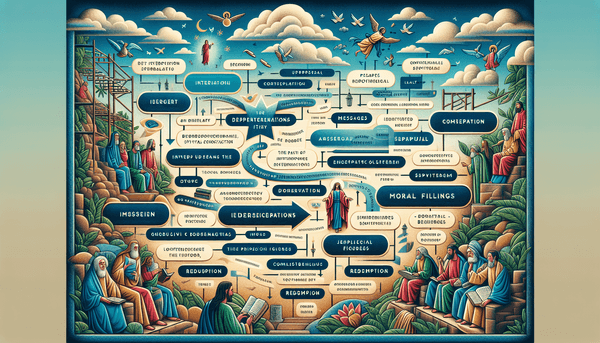Understanding Hebrews 10:26-27: A Message for All Believers
While Hebrews 10:26-27 was indeed penned with a Jewish audience in mind, highlighting the gravity of willfully turning away from the truth and persisting in sin after embracing the knowledge of Jesus Christ, its implications resonate with all who have encountered the gospel. This passage serves as a stern warning, urging believers to steadfastly hold onto their faith and avoid deliberate sin. Such a cautionary message is not confined to the first-century Jewish Christians but extends to all who, having been enlightened by the grace of God, are called to live in obedience. This is underscored by Romans 3:23, which reminds us that 'all have sinned and fall short of the glory of God,' pointing to our collective need for redemption. It is further echoed in 1 John 1:9 and Hebrews 4:15-16, which offer hope for forgiveness and encourage us to approach God's throne of grace with confidence in times of need.
Jesus as the Son of God and One with the Father
In the Christian faith, Jesus is unequivocally identified as the Son of God, a divine person who shares in the unity and equality with God the Father. The Gospel of John records Jesus proclaiming, 'I and the Father are one' (John 10:30), a profound assertion that cements His divine nature. Further, Jesus uses the sacred and eternal name of God, 'I AM,' aligning Himself with the God who revealed Himself to Moses in the burning bush (John 8:58). The Apostle Paul reinforces this belief, stating, 'For in him the whole fullness of deity dwells bodily' (Colossians 2:9). This intrinsic relationship is at the heart of the doctrine of the Trinity, which posits that one God exists in three persons: Father, Son, and Holy Spirit, a central tenet of Christian theology that shapes our understanding of God's very nature as revealed in the scriptures.
Deliberate Sin vs. Struggling with Addictions
The distinction between sinning deliberately and struggling with addiction is significant in Christian thought. Hebrews 10:26-27 speaks to the weighty matter of sinning willfully after receiving the knowledge of the truth, suggesting a greater level of accountability compared to the battles we face with persistent sins or addictions. The struggle with human weakness is acknowledged by the Apostle Paul, who wrote about doing the very things he hated, demonstrating the inner conflict between the flesh and the spirit (Romans 7:19). Christians are encouraged to live by the Spirit to not gratify the desires of the flesh (Galatians 5:16) and are reassured that no temptation has overtaken them that is not common to man, with God providing a way of escape (1 Corinthians 10:13). This promise of grace and the call to submit to God and resist the devil (James 4:7) provide hope and a path forward for those embroiled in the fight against addiction. For further insight on spiritual realities and personal faith, consider exploring related biblical discussions.
The Necessity of Accepting Jesus for Salvation
Within the Christian doctrine, the acceptance of Jesus as Lord and Savior is paramount to salvation. Jesus Himself declared, 'I am the way, and the truth, and the life. No one comes to the Father except through me' (John 14:6), positioning Himself as the exclusive gateway to a restored relationship with God. This exclusivity is emphasized by the apostles, as seen in Acts 4:12, which states there is salvation in no one else but Jesus. The unwavering proclamation that 'no one who denies the Son has the Father' (1 John 2:23) reaffirms the necessity of this belief. The famous verse from the Gospel of John, 'For God so loved the world, that He gave His only Son, that whoever believes in Him should not perish but have eternal life' (John 3:16), encapsulates the essence of this message, and Romans 10:9 provides a clear call to confess Jesus as Lord and believe in His resurrection as the path to salvation.
The Role of Mary in Christian Worship
Mary, the mother of Jesus, holds a special place in Christian history. Her unique role as the bearer of the Christ child is honored among many denominations. However, scripture is clear that worship should be directed toward God alone, as Jesus Himself states, 'You shall worship the Lord your God and him only shall you serve' (Matthew 4:10). Isaiah 42:8 speaks to God's exclusive claim to glory and worship, and Revelation 19:10 instructs John to worship God, not the angel revealing the visions to him. Mary's own words in the Magnificat, 'My soul magnifies the Lord, and my spirit rejoices in God my Savior' (Luke 1:46-47), indicate her recognition of her need for a Savior, just like any other human being. These verses highlight the Bible's stance on worship and the place of veneration versus adoration in the Christian faith.






